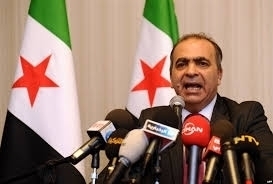By Walid al-Bunni, Spokesman for the National Coalition
If we want to analyze why the international community insists on a political solution through Geneva 2, we must re-characterize what is happening now in Syria— with much impartiality—so that we can deal with this international insistence in a way that better serves the goals of our revolution.
Is it still possible to talk about [Syria as] a revolution of a people against a tyrant as it was in its first year?
Did the regime succeed in transforming the revolution into a civil war with a sectarian dimension, as it has tried to market [the conflict] since the first day it began? Or did the revolution turn into a regional and international conflict from which the regional and international powers are trying to make political and strategic gains through supporting for [various] parties? This conflict has become a purely military affair after the decay of its peaceful and civil dimensions that have all but disappeared under the regime’s military machine, which has delivered blows to the peaceful movement so violently and cruelly as to be almost unique in history. [This has all been facilitated by] Russian, Chinese, and Iranian adoption of the regime and its policies, providing it with all kinds of military, political, and financial support.
While the opposition received hesitant and indecisive support from countries with no serious common objectives for their support, those same countries have oftentimes competed to control decisions. This has led to the opposition’s diffusion and sometimes corruption, thus strengthening a third party that has used this situation—in addition to the regime’s ugly crimes and its employment of sectarian Lebanese and Iraqi militias—to its own advantage. That third party is a key player on the Syrian arena and has gained control of most of the liberated areas. By third party here, I mean the powerful groups following the ideology of al Qaeda, including the Islamic State of Iraq and the Levant (ISIS) and other groups like it. Those groups serve the goal of the regime, which portrays the conflict as if it is between two groups: the regime, represented as the guarantor of religious freedom and protection for minorities (despite its corruption and tyranny) in the eyes of world's public opinion, and the radical forces of obscurantism hostile to Western civilization and anyone who is not with them. This [framing] has cost the revolution much sympathy and support from Arabs and the international community—it has also scared a lot of neutral Syrians about the possibility of the regime’s fall, and that Syria will fall into the hands of these ideological organizations.
If we agree on this characterization, then rejecting Geneva 2 and rejecting a political solution will lead to the loss of the remaining international and even Arab support. Syria will be torn between the choice of tyranny and corruption or repression, obscurantism, and ignorance.
But going to Geneva unconditionally, as demanded by Russia, means endless negotiations that will not differ so much from the international competition mentioned earlier.
So Geneva is not optional. But American, Russian, Arab, and international guarantees—through the Security Council if possible— could assure that the outcome of Geneva will prevent Syria and its people from both devastating options. But if the desire of the international powers is to Somali-ize Syria through the continuation of this destructive and bloody conflict, we will not be part of it. Rather, through a Syrian national meeting that includes everyone working toward a free, civil, and democratic Syria, let us seek a Syria reconciled with its neighborhood and with the international community on the basis of the unity of Syrian land and people. Whether or not such a meeting is sponsored by the Arab League, let us seek other solutions to save our country from these destructive alternatives.
Translated and edited by The Syrian Observer
......


